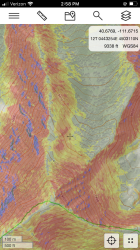Have any of yall heard of something called get-there-itus? Its almost an official term in aviation, and refers to the feeling of pressure that causes experienced pilots to do dumb shit (mis-read weather reports, skip checklist items, overload planes). It is one of the biggest killers in aviation, and because of this, there's tons of research that has been done on the psychology of these situations. Basically, when we really want to do something, we tend to cherry-pick information that reinforces our idea/goal. Nobody gets up in the morning, and says "I'm gonna go ignore the weather/avi forecast, and fly into deteriorating weather (and crash into a mountain)/ski an avi prone slope on a sketchy snowpack. These decisions are part of a chain of events/small decisions that start way back. So we have to be very aware of this chain, and how any minor decisions can effect us. Be hyper-aware of the little things that change your mood/judgement. You need to plan out your day before leaving the house. Not just basic shit (Where, who, when), but all the scenarios that you will encounter. Statements like "if X looks like ___, we go home" are very helpful in setting limits. Once your limits are set, don't push them at all. Justify/make all your decisions at home, when you are on the mountain, you will not always be in the right frame of mind to make new ones. Don't be afraid to speak up. If everyone in the group is thinking alike, then nobody is thinking (Unless you are all thinking about calling it quits). Remind yourself of the consequences of not skiing. Well, you don't get to ski. Thats it. You have nothing to lose by staying home.
The most important thing, as I've already mentioned, don't make big decisions on the mountain. Plan where you are going to ski, and what you are going to do if it looks sketchy. If zone A sucks, plan for zones B and C. STICK TO THOSE PLANS. If A, B, and C are sketchy, go the fuck home, unless you've planned for D. We like to think that we are rational beings, good at making decisions in all kinds of situations, but we really aren't. In fact, we're complete shit at it. Think about the Apollo 10 mission. It was intended as a dress rehearsal for the moon landing. They were to fly to the moon, orbit it at 47000' above the surface, and RTB. While the mission was in the planning phase, there was talk about carrying extra fuel, just incase something went wrong. But, they were never given the extra fuel. The mission planners knew that if the astronauts had extra fuel, that they would be tempted to try and land on the moon. Keep in mind that these astronauts were some of the best pilots in the world, all of them experienced at making decisions under pressure. But even back in 1960, we knew enough about psychology to say that these men were not to be trusted with the opportunity to try a landing. WE'RE NOT AS LOGICAL AS WE LIKE TO THINK.
Whenever a pilot makes a stupid decision, and gets himself (and often others) killed, it is not just his fault. Some of the responsibility must rest on anybody in his life who had the opportunity to influence his decision-making. Right from the beginning, first instructors, friends, co-workers all might have been able to say something to break the chain. We are more influenced by the opinions of others than we like to think. A friend relating a story of a friend of a friend doing something sketchy and getting away with it. A boss being just a little too insistent. An instructor being just a little too lenient. These are just a few of the many things that can start a chain of very small decisions that will lead to a fatal one.
There are old pilots, and bold pilots, but there are no old, bold pilots. Do you want to be an old skier, or do you want to get sent to oblivion by a steamroller of snow?
